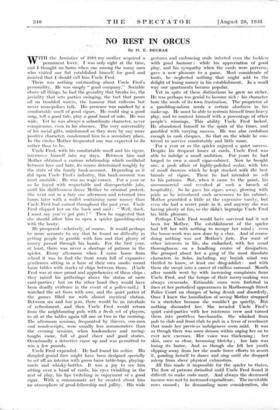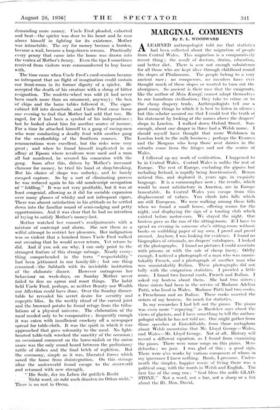NO REST IN CIRCUS
. By H. E. DEGRAS WITH the Armistice of 1918 my mother acquired a permanent lover. I was only eight at the time, and I thought no harm when one among the many men who visited our flat established himself for good and insisted that I should call him Uncle Fred.
There was .nothing outstanding about Uncle Fred's personality. He was simply " good company." Sociable above all things, he had the geniality that breaks ice, the joviality that sets parties swinging, the tact that pours oil on troubled waters, the humour that enlivens but never monopolises talk. His presence was marked by a comfortable smell of good cigars. He Could sing a good song, tell a good tale, play a good hand of solo. He was wide. Yet he- was always a subordinate character, never Conspicuous, even in his absence. The very universality of his social gifts, uninformed as they were by any more positive character, condemned him to a secondary place. In the circles Mother frequented one was expected to do rather than to be.
Uncle Fred, with his comfortable smell and his cigars, interwove himself into my days. Between him and Mother obtained a curious relationship which oscillated between love and hate, its course determined roughly by the state of the family bank-acconnt. Depending as it did upon Uncle Fred's industry, this bank-account was most unstable. He was no wage-earner. For a year or so he toyed with respectable and disrespectable jobs, until his shiftlessness drove Mother to criminal protest. She went out in a fury one afternoon and returned two hours later with a wallet containing more money than Uncle. Fred had earned throughout the past year. Uncle Fred clapped her on the back and said : " Well, duck, I must say you've got guts ! " Then he suggested that she should allow him to open a spieler (gambling-den) with the booty.
He prospered—relatively, of course. It would perhaps be more accurate to say that he found no difficulty in getting people to gamble with him and that plenty of money passed through his hands. For the first year, at least, there was never a shortage of patrons in the spieler. Every afternoon when I came home from school it was to find the front room full of expansive gentlemen sitting in a haze of their own smoke round baize tables with stacks of chips between them. (Uncle Fred was at once proud and apprehensive of these chips : they raised his gatherings above the status of mere Card-parties ; but on the other hand they would have been deadly evidence in the event of a police-raid.) I watched the set faces with awe, and the quiet patter of the games filled me with almost mystical elation. Between six and ten p.m. there would be an interlude of refreshment, and then Uncle Fred would return from the neighbouring pub. with a fresh set of players, to sit at the tables again till one or two in the morning. The afternoon sessions, frequented by thieves, con-men and nondescripts, were usually less remunerative than the evening sessions, when bookmakers and racing- toughs came, full of good cheer and good stories. Occasionally a detective came up and was permitted to win a few pounds.
Uncle Fred expanded. • He had found his metier. His dimpled genial face might have been designed specialty to set off an interior with green baize table-tops, playing- cards and whisky-bottles. It was a joy to see him sitting over a hand of cards, his eyes twinkling in the zest of play, his lips twitching in enjoyment of a good cigar. With a Consummate art he created about him an atmosphere of good-fellowship and jollity. His wide gestures and embracing smile infected even the luckless with good humour : while his appreciation of good play, and his sympathy when the cards were perverse, gave a new pleasure to a game. Most considerate of hosts, he neglected nothing that might add to the, delight of losing money in his establishment. In a small. way our apartments became popular.
Yet in spite of these distinctions he grew no richer. He was perhaps too genial to become rich : his character bore the seeds of its own frustration. The proprietor of a' gambling-saloon needs a certain aloofness in his make-up. He must be able to restrain himself from heavy play, and to content himself with a percentage of, other people's winnings. This ability Uncle Fred lacked. He abandoned himself to the spirit of the times, and gambled with varying success. He was also credulous enough to cash cheques. So that on the whole he con- trived to survive comfortably and little more.
For a year or so the spieler enjoyed a quiet success. Despite his frequent losses at cards, Uncle Fred was able to indulge a small ambition. For years he had longed to own a small cigar-cabinet. Now he bought one, a posh affair of highly-polished cedar, with lots of small drawers which he kept stocked with the best brands of cigars. These he had intended to sell to his patrons.. But, when it came to the point, his uncommercial soul revolted at such a breach of hospitality. So he gave his cigars away, glowing with pride as he introduced each newcomer to his cabinet.- Mother grumbled a little at the expensive vanity, but even she had a secret pride in it, and anyway she was having plenty of fun, so she didn't begrudge Uncle Fred his little pleasure.
Perhaps Uncle Fred would have survived had it not been for Mother. The establishment of the spieler had left her with nothing to occupy her mind ; even the house-work was now done by a char. And of course doing nothing was not Mother's forte. For want of other interests in life, she embarked, with her usual thoroughness, on a headlong course of dissipation. She grouped about her a gang of the most dissolute characters in Soho, including, my boyish mind was thrilled to know, at least one drug-addict : and with them she swept into a career of endless carousal. Month after month went by with increasing complaints from Uncle Fred, and the tempo of their merry-making was always crescendo. Estimable sums were forfeited in fines at her periodical appearances in Marlborough Street Police Court on charges of being drunk and disorderly. Once I knew the humiliation of seeing Mother strapped to a stretcher because she wouldn't go quietly. But nothing dissuaded her. She invaded Uncle Fred's quiet card-parties with her roisterous crew and turned them into profitless bacchanalia. She whisked from pub to club and from club to pub in a fever of revelment that made her previous indulgences seem mild. It was as though there was some demon within urging her on to ever new excesses. Her voice was thickening ; her skin, once so clear, becoming blotchy ; her hair was losing its lustre. And as though she felt her youth slipping away from her she made fierce efforts to assert it, goading herself to dance and sing until she dropped asleep from sheer physical exhaustion.
All this made it impossible for the spieler to thrive. The flow of patrons dwindled until Uncle Fred found it difficult to make ends meet. And always the decreased income was met by increased expenditure. 'The inevitable rows ensued ; he demanding more consideration, she demanding more money. Uncle Fred pleaded, exhorted and beat—the spieler was dear to his heart and he rose above himself in fighting for its -existence. - Mother was intractable. The cry for money became a burden, became a wail, became a long-drawn scream. Practically every penny that came into the home was drawn into the vortex of Mother's frenzy. Even the tips I sometimes received from visitors were commandeered to buy booze with.
The time came when Uncle Fred's card-sessions became so infrequent that no flight of imagination could sustain our front-room in its former dignity of a spieler. He -accepted the death of his creature with a shrug of bitter resignation. The roulette-wheel was sold (it had never been much more than an ornament, anyway) ; the box of chips and the baize tables followed it. The cigar- cabinet fell into desuetude, and Uncle Fred came home one evening to find that Mother had sold that too. He .raged, for it had been a symbol of his independence ; but he looked about him for another source of income. For a time he attached himself to a gang of racing-men who were conducting a deadly feud with another gang for the overlordship of the Southern courses. The remunerations were excellent, but the risks were very great ; and when he found himself implicated in an :affray at Epsom where revolvers were used and a man all but murdered, he severed his connexion with the gang. Soon after this, driven by Mother's incessant clamour for money, he tried his hand at shop-breaking. But his choice of shops was unlucky, and he barely escaped capture. So by a sort of eliminating process he was reduced again to his old nondescript. occupation -of " fiddling." It was not very profitable, but it was at least congenial, allowing as it did for sociable expansion over many glasses of whisky and not infrequent cigars. There was almost satisfaction in his attitude as he settled down into the familiar round of semi-cadging and petty opportunisms. And it was clear that he had no intention of trying to satisfy Mother's money-lust.
Mother watched her consort's readjustments with a mixture of contempt and alarm. She saw them as a wilful attempt to restrict her pleasures. Her indignation was so violent that a hundred times Uncle Fred walked out swearing that he would never return. Yet return he did. And if you ask me why, I can only point to the strangest feature of this strange menage. Nearly every- thing comprehended in the term " respectability " had been jettisoned in our family-life : but one thing remained—the Sabbath with its inviolable institution of the elaborate dinner. However outrageous her behaviour on week-days, on Sunday Mother never failed to don an apron and roast things. The habit held Uncle Fred, perhaps, as neither Beauty nor Wealth nor Affection could have done. Over the Sunday dinner- table he revealed his secret desire for security and eupeptic bliss. In the weekly ritual of the carved joint and the browned potato he found refuge from the tribu- lations of a physical universe. The elaboration of the meal needed only to be comparative ; frequently enough it was eaten with insufficient crockery off a newspaper spread for table-cloth. It was the spirit in which it was approached that gave solemnity to the meal. No light- hearted table-talk wrecked the sanctity of the occasion ; an occasional comment on the horse-radish or the onion sauce was the only sound heard between the preliminary rattle of dishes and the final belch of repletion. But the ceremony, simple as it was, liberated forces which saved the home from disintegration. On this strange altar the underworld found escape to the .overworld And returned with new strength.
"Die Seele, der im Leben. ihr gottlich.Recht Nicht ward, sic. ruht auch drunten.im Orkus nicht." There is no rest in Orcus,







































 Previous page
Previous page